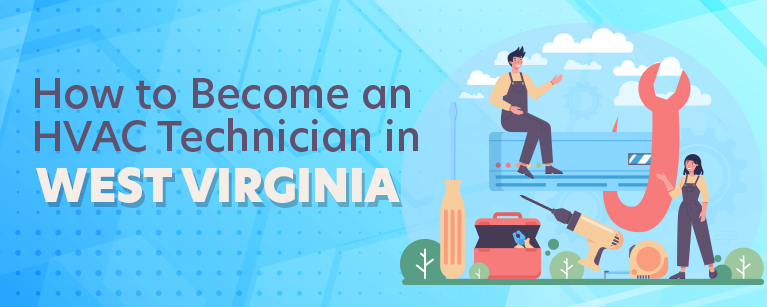
A career in the heating, ventilation, and air conditioning (HVAC) industry is lucrative because the services offered by technicians are critical to homeowners and business operators.
During the hot summer season, an HVAC system keeps the internal environment cool, and it also maintains warm indoor temperatures in winter.
Therefore, becoming an HVAC technician is a great idea.
This guide explains everything you need to know about how to become an HVAC technician in West Virginia.
Table of Contents
How to Become an HVAC Technician in West Virginia: A Step-by-Step Guide
The US Environmental Protection Agency (EPA) requires that any professional who deals with maintenance, repair, service, or disposal of equipment that releases refrigerants into the environment should get Section 608 certification first.
Therefore, if you want to practice as an HVAC technician in West Virginia, you must obtain EPA Section 608 Certification.
You can achieve this by following the steps below.
Have high school certification
Although this is not mandatory, one must complete high school education first and obtain a diploma or GED equivalent to begin their journey of becoming an HVAC technician.
Additionally, you need to be at least 18 years old to join this particular field.
Begin your HVAC Certification training or education
Various schools in West Virginia provide HVAC training programs designed to equip the trainees with the knowledge and skills required in the industry.
You can choose to get your HVAC certification via the formal route.
This involves enrolling at an appropriate institution to receive classroom training and obtain a diploma or associate degree, which can take up to two years.
Certificate programs are short courses offered by different institutions to individuals interested in pursuing careers as HVAC technicians in West Virginia.
You can also enroll in an apprenticeship program to gain hands-on experience.
This option can take up to 4 or 5 years to get certification.
Alternatively, you can also consider the option of getting entry-level work with a registered HVAC company.
Apply for an HVAC technician Training License
The West Virginia Division of Labor requires prospective HVAC technicians to apply for a training license to help document their work experience.
You will need to work for at least 2,000 hours under the supervision of an experienced and licensed technician.
For the Residential Technician license in West Virginia, no specific experience is required.
However, candidates must pass the exams offered within the state.
Take the license examination for HVAC Technician
It is mandatory to pass the license exam for HVAC technicians administered by PSI Exams.
When you meet all the above requirements, you can apply for a license.
The fee for an HVAC Technician in Training license is $25.
Look for work
Once you obtain an HVAC license, you can start looking for work related to your qualifications or open your business to become a contractor.
Remember to renew your license annually.
Why You Need an HVAC License
If you want to get employment as an HVAC technician or intend to become a contractor in West Virginia, it is mandatory to get a license.
This is a basic requirement from the beginning of your career in this sector.
The West Virginia Division of Labor licenses and regulates HVAC technicians and contractors.
There are four main types of HVAC licenses including the following:
- HVAC Technician in Training license
- HVAC Technician license
- HVAC Residential Technician license
- HVAC Contractor license
Every level of the workforce within the HVAC industry including technicians, apprentices, and contractors must be licensed to legally perform activities such as heating, refrigeration, and air conditioning in West Virginia.
Certification
To find the institutions that offer 608 certification in West Virginia, you can visit EPA.gov to get more details.
Once you take your exam, you will get your EPA certification for refrigerant from an approved institution.
The four types of EPA Certifications include the following:
- Type I- ideal for small appliances with less than five pounds of refrigerant.
- Type II-high pressure units including residential or commercial systems with five or more pounds of refrigerant.
- Type III- for disposal or servicing of low-pressure appliances
- Universal- it covers all appliances and systems in I, II, and III above.
Other national certifications that can give you an added advantage include the American Society of Heating, Refrigeration and Air-Conditioning Engineers (ASHRAE), North American Technical Excellence (NATE), and others.
These certifications are not required but simply improve your prospects in the industry.
West Virginia HVAC Programs and Schools
Only two organizations are responsible for approving HVAC programs and schools countrywide including HVAC Excellence and the Partnership for Air-Conditioning, Heating, Refrigeration Accreditation (PAHRA).
At the moment, HVAC Excellence has not accredited any program in West Virginia.
PAHRA has accredited the first two programs in West Virginia including:
HVAC Technician program Carver Center in Charleston
- Meant for adults with GED or high school graduate
- The program costs $8,585
- 10 months duration
The HVAC program at Ben Franklin Vocational Center in Dunbar
- Meant for high school students who join as juniors
- The program is two years
- Adults get an 11-month welding program
West Virginia Northern Community College
- Offers Associate of Applied Science, Air conditioning, Refrigeration, and Heating Technology Degrees
- Four-semester program
- 60 credits
- Tuition costs $7,000
James Rumsey Technical Institute In Martinsburg
- Full-time HVAC/R program
- 11 months
- 30 hours per week
- Tuition costs $7,637
HVAC at Cabell County Career Technology Center
- Public college with an enrolment of 76
- 2 years
- $100 application fee & tuition $5,553 per year
- 94% of students receive financial aid
Monongalia County Technical Education Center
- A small college with 69 full-time students
- $3,062 per year & $100 application fee
- 2 years
| School Name | Address |
|---|---|
| HVAC Technician program Carver Center in Charleston | 4799 Midland Dr, Charleston, WV 25306, United States |
| The HVAC program at Ben Franklin Vocational Center in Dunbar | 500 28th St, Dunbar, WV 25064, United States |
| West Virginia Northern Community College | 1704 Market St, Wheeling, WV 26003, United States |
| James Rumsey Technical Institute In Martinsburg | 3274 Hedgesville Rd, Martinsburg, WV 25403, United States |
| HVAC at Cabell County Career Technology Center | 1035 Norway Ave, Huntington, WV 25705, United States |
| Monongalia County Technical Education Center | 1000 Mississippi St, Morgantown, WV 26501, United States |
HVAC Technician Salary in West Virginia
According to the U.S. Bureau of Labor Statistics, the annual salary for HVAC installers and mechanics in West Virginia is $44,920.
The following are the average salary scales for professionals in the HVAC industry in this region.
- HVAC installer earns an average salary of $22.13 per hour and $6,750 overtime per year.
- HVAC technician gets an average salary of $23.20 per hour and $6,750 overtime per year.
- The average salary for an HVAC mechanic is $21.30 per hour.
- The average salary of an HVAC supervisor is $63,582 per year.
The salary scales are determined by different factors such as experience, city, education, additional skills, and certifications.
Annual Salary Range:| Location | Avg. Annual Salary |
|---|---|
| Charleston | $44,662 |
| Huntington | $43,794 |
| Morgantown | $48,001 |
| Parkersburg | $43,539 |
| Wheeling | $48,001 |
| Weirton | $47,799 |
| Fairmont | $48,001 |
| Beckley | $44,270 |
| Clarksburg | $43,147 |
| Martinsburg | $54,336 |
Regional Salary in West Virginia
| Region | Employed | Avg. Annual Salary | Avg. Hourly Pay | Top 10% Annual Salary | Bottom 10% Annual Salary |
|---|---|---|---|---|---|
| Beckley, WV | 100 | $41,440 | $19.92 | $58,530 | $29,210 |
| Charleston, WV | 390 | $50,030 | $24.06 | $76,840 | $31,070 |
| Huntington-Ashland, WV-KY-OH | 440 | $47,790 | $22.98 | $66,560 | $31,200 |
| Morgantown, WV | 160 | $46,120 | $22.18 | $63,610 | $30,710 |
| Parkersburg-Vienna, WV | 80 | $39,000 | $18.75 | $55,970 | $29,710 |
| Weirton-Steubenville, WV-OH | 70 | $47,260 | $22.72 | $63,310 | $31,120 |
| Wheeling, WV-OH | 130 | $51,040 | $24.54 | $73,850 | $34,140 |
* Employment conditions in your area may vary.
Frequently Asked Questions
Can I do my HVAC technician training course online?
No, you cannot complete your HVAC technician training program online.
You must first learn the trade to get the necessary work-related experience and then take your licensing exam.
You can achieve this by enrolling in a college to get a diploma or certificate, choosing an apprenticeship program, or looking for an HVAC company that offers entry-level work.
Remember, you’ll need to learn under the supervision of a qualified and licensed supervisor.
How much does it cost to train as an HVAC technician?
The cost to train as an HVAC technician varies depending on the route you take to get certification.
For instance, if you train on the job, you will instead get a lower wage than paying for your education.
The only fee you should pay is for an HVAC Technician in Training license. Apprenticeship programs in West Virginia are cost-effective.
However, you will have to pay tuition if you join a vocational school, community, or technical college for your certificate.
The HVAC certificate or degree programs at community institutions cost about $7000, whereas the same qualification at a private college or university costs about $15,000.
Can I work as an HVAC technician without a license?
It is mandatory for anyone intending to work as an HVAC technician in West Virginia to get a license first.
Whether you are a trainee technician, an apprentice, or a contractor, you must be licensed by the West Virginia Division of Labor to legally perform refrigeration, heating, and air conditioning work.
HVAC Technician Info by State
- Alabama
- Alaska
- Arizona
- Arkansas
- California
- Colorado
- Connecticut
- Delaware
- Florida
- Georgia
- Hawaii
- Idaho
- Illinois
- Indiana
- Iowa
- Kansas
- Kentucky
- Louisiana
- Maine
- Maryland
- Massachusetts
- Michigan
- Minnesota
- Mississippi
- Missouri
- Montana
- Nebraska
- Nevada
- New Hampshire
- New Jersey
- New Mexico
- New York
- North Carolina
- North Dakota
- Ohio
- Oklahoma
- Oregon
- Pennsylvania
- Rhode Island
- South Carolina
- South Dakota
- Tennessee
- Texas
- Utah
- Vermont
- Virginia
- Washington
- West Virginia
- Wisconsin
- Wyoming









